The Social Culture of Planets, Wisconsin on Lake Lucerne
THE SOCIAL CULTURE OF PLANETS, WISCONSIN ON LAKE LUCERNE by Verol Ritchie Tyler and son, Norman Henry Tribbett
The following is an excerpt from a history of the Forest County Potawatomi and the Ritchie Family of that community written by Mr. Norman Henry Tribbett. This history of Planets, Wisconsin and Lake Lucerne’s north shore covers the period 1900-1940. I wish to thank David Bruss, John ‘Jack’ Liethen, Henry Charles Ritchie and the marketing firm handling the manuscript..in addition, a thank you to Dr. Susan Stans for proofreading and editing and my sister, Mary, for the webpage creation you see here…. 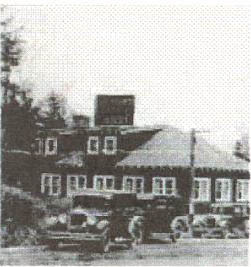
Often in conversations we speak of that time called yesterday —’the good old days’. A time when not many cabins or homes were on the lakes of northern Wisconsin. That was a time when the fish were big and plentiful and the lakes, rivers and streams were home to varieties of fish not found there today. At least this is how the story goes. Yesterday, in truth, is moot as yesterday may or may not have been the good old days.
Native Americans had Long camped at the Lake Lucerne area. The Reverend Erik Olsen Morstad had expanded his mission work and opened a mission school for them just to the north of the lake. Local native families were Chippewas and Potawatomi. The Jim Hardhead family, the Sam Wabba family, the Seymour, and the Sturdevant brothers Tom, George, Samuel, Miles, and their mother frequently camped along the shoreline. One Hardhead family member, Ben Smith, the son-in-law of Jim Hardhead would later marry a Potawatomi member of the George family. Their native camps added a flare to the wilds of the north woods.
In the early decades of the 20th century the north shore of Stone Lake, later to be named Lake Lucerne, was an enclave nestled in the forested rim of the natural geological bowl where green hillsides met the lake shore. This community, only a few miles from Crandon, Wisconsin, provided Stone Lake with a unique social culture. Early accounts state that Crandon residents would go out on the weekend and picnic on the shores of Stone Lake. The enclave would later become known as Planets* Wisconsin officially in 1922.
In the beginning John Wilcox, a surveyor, who had come to the area in 1898 and Frank Schumacher, a local cabinet maker, purchased five acres of land on the north shore of the lake in 1904. On this property they would build a two story hotel which would become part of one of the first resorts in the Crandon area, called the Stone Lake Resort. The construction of the resort coincided with the construction of the first passenger railroad line into Crandon built on the east shore of Lake Metonga. The rail line would be an impetus to the success of the resort, similar to Henry Flager’s development of resorts in Florida.
The company of Sackett and Helm began building the hotel in April 1906. After two months, they held the formal opening of Stone Lake Resort. The Crandon City band played on the shores of the lake for residents and guests. The resort offer lawn tennis. A day of partying launched one of Forest County’s first resorts into a colorful future.
Even before the hotel was constructed, Wilcox and Schumacher built a 14 by 24 foot ice house, a 24 foot square boathouse / pavilion and started construction of 12 by 14 foot cabins. The boathouse was a two story structure with storm shutters all around the second level. The second floor would be used as a pavilion. In February 1906, the ice cover on the lake was 21 inches thick and Wilcox filled his icehouse. Wilcox did the work, Schumacher was an investor.
The next few years would be a busy time for John and Anna Wilcox. Besides the work involved with their new adventure, they began their family — Vyrl M. Wilcox was bom that November of 1906 followed by sister Orpha two years later.
It is yet unclear what business relation existed between brothers Joseph and Robert Uihlein and Wilcox & Schumacher . The Uihlein Schlitz Brewing company’s club house and farm was just across the road and a quarter mile up the hill from the Stone Lake resort. The Schlitz company families had been using this site for several years. August Uihlein, Joseph and Robert’s father, had acquired over one thousand acres in 1889 and 1890 of Forest County properties through the homestead act. Most of this acreage was near Laona, Wisconsin. Through various land transactions, his company also acquired the lake property at Stone Lake. The company maintained a large gasoline launch (boat) and several smaller launches. The Stone Lake resort used these same boats as part of their services as well.
Some sort of relationship had formed between the Uihlein and the Wilcox. Their children would later form friendship bonds. The children would wear the proper attire of the day for play together or for dinner. Within three years, in the Spring of 1909, Robert Uihlein, Sr. was making arrangements to turn the management of the Schlitz property over to Wilcox and Schumacher. This was partly due to the decision by Mr. Uihlein to remove “Battling Nelson” as overseer of the property who had begun selling timber from the Schlitz lands and pocketing the money. Within a week of this announcement, the hotel at the Stone Lake Resort was burned to the ground. Arson was suspected. Joseph Uihlein relocated his employee to Milwaukee.
Wilcox took over the management of the Schlitz property. Business returned to normal and by the end of April 1909 John Wilcox was stocking the lake with 25,000 lake trout provided by the Wisconsin State Fish Hatchery. Lake fish and the farm gardens supplied the kitchen of the resort. The working relationship between Uihlein and Wilcox would continue until the sale of the Schlitz property in 1912.
The Wilcoxes had been known for hospitality and the reputation followed them as they began work for Keith and Hiles when that company purchased the Schlitz club house and farm. Locals and tourists patronized the Wilcox business. Notices at the lake like “Boys, no bathing without suits allowed while ladies are around” greeted the tourists visiting the resort.
James Beulan, a Civil War veteran, had been a passenger on the gasoline launch when he fell into six inches of water and nearly drowned. John Wilcox pulled the elderly Beulan back into the launch. Once in the launch and in a drunken state of panic, Beulan kicked the gasoline engine and stove in the launch to pieces.
Timber rights and property purchases along the lake began in 1908 and by 1916 the Keith and Hiles Company owned most, if not all of the lake property and they were looking for a surveyor to sub-divide the lake shore into lots. That year the John Wilcox family moved away from the north shore area. John and Anna Wilcox would farm in Langlade County near Ainsworth some years later. The Keith and Hiles Company had sold enough timber from the hills around the lake to make a profit but left some standing timber to make the lake attractive to a potential lakeshore lot buyer. 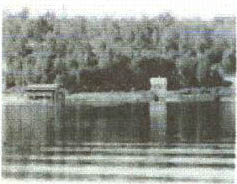
The formal introduction of the nature of the north woods to a new generation of white men had occurred on the north shore of Stone Lake. That led to a relationship as nature mingled with the nighttime stars. And the stars fell upon the north shore for the Planets Resort was built by the Bruss family on the grounds of the former Stone Lake Resort. When the Bruss came to the area, the physical characteristics of the north shore saw change. The shoreline was cleared of trees as more cabins were built. The original boathouse was replaced. Guard rails were installed along the road approaches. It would be the Planets Resort which would be remembered for the next ninety years.
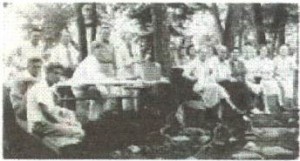 The Planets Resort of the 1920s, 1930s and 1940s was a popular northwoods escape for tourists from Milwaukee and Chicago. The lake had also attract American for hundreds of years. Tourists often took the train north from C Milwaukee to the station at Monico, Wisconsin.
The Planets Resort of the 1920s, 1930s and 1940s was a popular northwoods escape for tourists from Milwaukee and Chicago. The lake had also attract American for hundreds of years. Tourists often took the train north from C Milwaukee to the station at Monico, Wisconsin.
From Monico the rail passengers would be picked up and transported the 15 miles or so to the resort. From the trains at Crandon the ride to the resort was a $1. for a car load of up to four people. The Native American continued to travel the foot paths in the area.
The country roads in those days were not paved and the hillside approaches to the resort could be hazardous when mired from the summer rains. Valentine ‘Val’ Ritchie, a local Potawatomi, on occasions used his team of horses to pull touring cars out of the mud along this part of old highway 8. Negotiating the steep hilly roads could be difficult enough at other times of the year. In spring, the thawing and freezing created the worst kind of driving conditions. The automobiles often slid down hill and 1st gear (low) was needed to go up the other side. Once in awhile a car would back up the hill utilizing a low gear and giving the vehicle a front wheel drive. In winter, snow storms often prevented travel until the road was plowed. 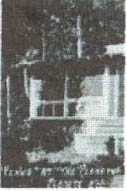
A set of cabins, which were scattered on the hillsides near the resort, were named after the known planets — Saturn, Mars, Jupiter, Venus and Mercury. No two cabins were alike and each had a fireplace. Rooms in the main building were $4.50 a day for one person; $4.00 for two persons. Children under ten were half rate. Cabins were designed for sleeping and sitting — no kitchens. Tourists patronized the Planets dining room. Being lighted by a gasification plant, several of the cabins later burned. A large log house to the north of old highway 8 was part of the Planets complex.
A barn was located next to the log house. A few horses were kept for the tourists to ride during the season. The barn and the log house had been built years earlier by the Schlitz Company for crowds from Milwaukee who were entertained. William and Anna Steffens owned the only other resort on the lake. Mr. Steffens sold the Island View Resort on the lakes south side to Laura Kranzusch in 1939.
There were not many privately owned cottages or homes on the lake in those days and the east side of the lake had very few cottages in the 1930s. Some of the seasonal cottage owners on the east side included— Karl W. and Paul Deoge, the father and son physicians who had opened the first clinic at Marshfield, Wisconsin; Dr. Silas Evans, the president of Ripon College; the L. A. Reinerts, and the Liethens of the Appleton grain elevator family. The west side included- the Knotts, the Ryans, Mini Berant and Jack Zadik. All were located relatively close to the north end of the lake except the Liethen cabin which was one and a half miles down the eastern shore. Although the building boom on the lake began after World War II, many of the older cottages can still be seen on the northern upper eastern and western shores of the lake. Some stand like historical landmarks. The yellow log Doege cabin is the best example. Dr. Karl Doege had built the cabin for his wife and named it, Ihre Traum, which means Her Dream in German. 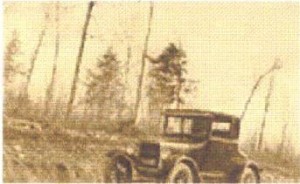
The Liethen cabin, one of the original structures was built in 1921 inch thick, tongue and groove cedar. Access to the cabin in the 1930s v basic foot path which really was two ruts along the hillside; no drivews days. A good pair of hiking boots helped the traveler walk the path after the [?] was parked.
The Liethens were a large family both physically and in numbers. Anna Liethen had continued the family business with sons Andrew, Robert, Alois and Frank after the father died in 1920. Many of the family came to the lake cabin. Mr. Frank Liethen, Sr. came to Henry Ritchie, Sr. and asked him to build a touring boat for the family. Henry began his work to the jokes around the community that no touring boat could possibly hold the Liethen family. The Ritchie grandchildren help m the construction by stuffing cording between the planks, giving the vessel greater waterproofing. Henry completed the larger-sized boat and Mr. and Mrs. Liethen went touring the lake with their children.
Two Liethen sons got appointments to two top military academies with Wisconsin Senator Joe MaCarthy’s help. The Senator had been a classmate of Frank Sr. A son, Colonel John A.”Jack” Liethen, worked for the Wisconsin Army National Guard for over 25 years. Frank Liethen, Jr., was accepted into the U.S. Naval Academy and later into the astronaut program in 1963. Frank died in an air experiment in 1966 in Nevada while with the NASA program.
When the Senator came to the lake he sometimes flew in on a sea plane. The sight of the sea plane landing on the lake created much excitement for the Ritchie children. Adding to his own thrill,Val Ritchie managed to take a ride above the lake. Val would guide and fish with Senator and Frank, Sr. often. Val called himself a communist and often said if the communists took over America the Indian and the blacks would be the first to “sign up”. Val had experienced social injustices and had observed the treatment of the blacks in America.
Mr. and Mrs. Reinert from Chicago had purchased the Acey cottage and remodeled it. The Reinerts often entertained with contract bridge parties. Mrs. Reinert was much younger than L.A. Rienert. They had met on one of Mr. Rienert’s trips to Miami, Florida. She already had a son, Brice, when they married. The elderly Rienert raised Brice as his own and paid the tuition for the young man to attend the Morgan Park Military Academy in Chicago. Henry Ritchie couldn’t pronounce Brice so he called him Prize.
The main building of the Planets provided the proprietor, the Otto Bruss family, with a small 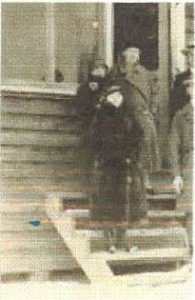 apartment residence and a business. Mr. and Mrs. Bruss were already elderly when they settled at the lake from the Wausau, Wisconsin area where the elder Brass had been a real estate agent. Mr. Brass became active in the town of Lincoln and became town treasurer. Proprietorship was a family affair with some of the Brass children later taking over the management of operations. Besides a dining room and large garage, the complex included a small office with individual mail boxes for the area’s cottage locals and for summer guests. With no bathrooms in those days, guests made the trip to the outhouse.
apartment residence and a business. Mr. and Mrs. Bruss were already elderly when they settled at the lake from the Wausau, Wisconsin area where the elder Brass had been a real estate agent. Mr. Brass became active in the town of Lincoln and became town treasurer. Proprietorship was a family affair with some of the Brass children later taking over the management of operations. Besides a dining room and large garage, the complex included a small office with individual mail boxes for the area’s cottage locals and for summer guests. With no bathrooms in those days, guests made the trip to the outhouse.
A generator out back provided electricity for the main complex and was used to pump water. David Brass, grandson of the elder Brass, recalled, ” an old model T engine was built on a platform over the edge of the lake that pumped lake water up to a reservoir up the hill.” This water supplied a few of the local cabins and the Planets. Young Brass often wondered if the vibrating engine and platform would fall into the lake when it ran.
Guests had access to long distance telephone and telegraph connections at the resort’s office. A small service counter offered ice cream, ring bologna, bread and a few canned products. Cigars and cigarettes were also available. The small post office and store counter were a social gathering place where area gossip was exchanged and the news of the day was discussed. Some lake guests piloted their boats up to the lodge to receive their mail. Val and Marie Ritchie ran the mail route from Crandon to Planets, Wisconsin for a short time until February 1931. The mail route ended abruptly when the Planets resort main building burned. The route was then put out on bids and extended to Sugarbush Hill.
The Uihlein banking and brewing family of Milwaukee, the Robert and Emily Lackey family of Oakpark, 111. and the Edwards of the Edwards Motors Company family all had cabins near the Planets. The Lackeys brought their daughter, Ester Herzog and grandson, Robert H. Herzog. It was a short walk down the hill for residents to the beach from their cottages.
Even after selling, the Joseph Uihlein family and servants would camp on one of the lake islands. Joseph’s brother, Robert Uihlein Sr., would later become a banker in Milwaukee and rarely came to the lake. Robertas wife, Mary Uihlein, or the governess, Louise, would bring the children, Bobby and Mary, to the beach to swim, play, and explore the lake area. Mary Uihlein often sat beneath an umbrella and read as her son, Bobby, and her daughter, Mary, played. Bobby was outfitted with water wings for safety creating a comical sight. Many years later, Bobby would run part of the family business in Milwaukee.
Mrs. Edwards of the Edwards Motor Company became a summer acquaintance of Marie Ritchie. The Edwards daughters had matching swim outfits with matching skirts which Sue Edwards, one of the daughters, did not much care for. Mrs. Edwards gave the skirts to Marie Ritchie who made short sets out of them for her daughters, Verol and Ruth. The two Ritchie girls from the reservation thought they were hot stuff in their matching short sets.
Val Ritchie worked at the Planets during the short three month summer season. He worked at the boathouse cleaning boats, renting boats or cleaning motors. Row boats were $1 a day or $5 a week. Johnson row boat motors were $3 a day or $10 a week. Motor oil saturated the wooden planked floor, permeating the room with its scent. The two-story, dark green boathouse also provided a couple of rental rooms above for summer employees who were treated to a wonderful southern view of Lake Lucerne . The boathouse sat at the lake’s edge on a pier extending out into the lake giving the building a much bigger appearance. The children would often laugh and giggle trying to answer their voice echoing within the empty boathouse. Beyond the pier, a breakwater of logs and rocks protected the shore and swimming area. The sounds of water lapping the breakwater or the puttering sound of a boat motor taking fishermen out for the day broke àie otherwise quiet moments. Val’s children played at the boathouse and swam with the children of the tourists who came to use the beach. The beach was used for bathing and sunning. The beach was mainly for the tourists, but many locals, including youthful Potawatomi, spent several sunny afternoons enjoying the water. The children of the Kokoma school took outings to the boat house and beach. Food for these outings was prepared in the upstairs area of the boat house.
Ike George, Val’s cousin, was a guide on the Lake. The two cousins would spend many hours 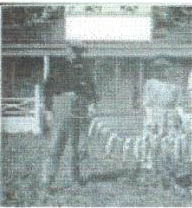 talking to each other at the boathouse. They also spent many hours playing cards with the Bruss in the evening. Even the card game had a celestial theme. The game was called Shoot the Moon. Ike George provided a guide service to fishermen for many years. Ike also looked after the Planets when the Bruss family were away for a couple days. Ike was said to be the most honest Indian around.
talking to each other at the boathouse. They also spent many hours playing cards with the Bruss in the evening. Even the card game had a celestial theme. The game was called Shoot the Moon. Ike George provided a guide service to fishermen for many years. Ike also looked after the Planets when the Bruss family were away for a couple days. Ike was said to be the most honest Indian around.
The Bruss family son, Walter, married Erna Pieplow. Erna’s father was the president of a Building and Loan in Milwaukee and was part owner and founder of Security Savings and Loan. Whenever the elder Pieplow was introduced to someone, he’d say, “This is the hand that shook the hand of President Coolidge.” The elder Pieplow was active in Wisconsin politics during this period. Mr. Pieplow did not exactly like Walter Bruss after the couple were divorced in 1935. A son, Carl Bruss, lived in Wausau and passed away at an early age in the 1930s.
Walter Bruss worked for the railroad on the postal car run from Milwaukee to Ashland. Walter 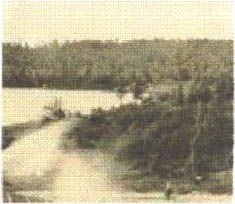 was also the postmaster for Planets, Wisconsin and a real estate broker. As early as 1922, Walter Bruss was arranging for the Potawatomi to put on performances of the war dance. Billed as an Indian pow-wow, tourist could watch these performances every Saturday evening at 8 P.M. with Sunday shows at 2 and 8 P.M.
was also the postmaster for Planets, Wisconsin and a real estate broker. As early as 1922, Walter Bruss was arranging for the Potawatomi to put on performances of the war dance. Billed as an Indian pow-wow, tourist could watch these performances every Saturday evening at 8 P.M. with Sunday shows at 2 and 8 P.M.
Frieda Bruss, the only daughter, was a secretary in Milwaukee and came north on vacation during the summer. A brother, Oscar H. Bruss, who had been employed as a printer for a newspaper in Wausau, also lived in Milwaukee. William Bruss another brother, also known as Bill, was an architectural engineer. William had been in Russia 1928-1932 during that country’s the first five year plan.
Bill Bruss traveled around the world after his years in Russia. Photography became his avocation on that trip. His interest in this hobby continued for many years. He often took photos around the Planets. One was the moonlight on Lake Lucerne. He set his camera up on the hill on the north side of the lake and snapped the picture at noon and then 12 hours later, when the moon was in position, took another on the same plate. It was a beautiful photo and the Bruss had postcards made of it. He also took photos of Potawatomi tribal members. Bill was creative and wanted the tourist to experience nature as he has. Bill developed hiking trails for the tourists.
A large sign at the beginning of the trail read:
Historic Indian Trails
Chippewa trail takes you through miles of untouched forests and across the historic hunting \ grounds of the red skin. You wind your way along the time worn trail, used to this day by the Potawatomi and Chippewa Indians, gradually gaining in altitude until you reach the top of a thickly wooded slope of virgin timber. From this vantage point you can see the Planets farm, Lake Lucerne Hill and the state highway. Continuing along the trail you soon come to an opening in the vast forest where a delightful view unfolds, in the foreground are the quiet waters of beautiful Devils Lake, in the distance, miles and miles of virgin forests.
You can return via Potawatomi Trail, winding through dense forests where wild life can still be seen, and from a high elevation you see enchanting Lake Lucerne and its magnificent shore line, where the road takes you to Planets Resort.
William Brass also wrote the following poem about the lake, the original on birch bark which the family has displayed in their home for 75 years. Copies of this poem were given out to lake residents. To Wisconsin’s Lake Lucerne
O Lake Lucerne, thou woodland gem,
Nestled in those lovely hills,
Where rugged shores thy waters stem
And the robin’s music thrills.The land of song within thee lies,
Watered by thy living springs,
Shaded nooks and sunny skies
How akin to heav’nlv things.Oft in sadness and in illness,
I have watched thy waters bide
Till the beauty of its stillness
Overflowed me, like a tide.And in better hours and brighter,
When I saw thy waters gleam,
I have felt my heart beat lighter.
And leap onward like a stream.Across thy waters, deep and blue.
Sparking moonbeams softly glide
And give thy shores a richer hue,
In the peace of even-tide.Not for this alone I love thee.
Nor because thy forests near;
Friends I love have dwelt beside thee,
And have made thy margin dear.More than this; — thy name reminds me
Of some friends, all true and tried;
And that name like magic binds me
Closer, closer to thy side.It is for this, thou Placid Lake!
That my spirit leans to thee;
And never, never to forsake,
Take this idle song from me.
Through his travels Bill Bruss remembered Lake Lucerne in Switzerland and thought Stone Lake was very much l ike that lake; Hence he came up with the idea, and his brother, Walter, wrote the letter which influenced the county to rename the lake, Lake Lucerne. Walter was given credit for renaming the lake when it had actually been William’s idea. Bill also would help run the Planets for short periods after the hotel burned and Otto Bruss died. Mrs. Ella (Alwina) Bruss owned the place for a number of years. It was Walter Bruss who sold and repossessed the Planets several times.
One of these owners were Harry and Agnes Menne who raised their children Harry, Germaine and Bonnie in the neighborhood. The Menne had moved up from Green Bay on the advice of a cousin who lived in Laona. They officially took over in April 1937. The Menne quickly became friends of the Valentine Ritchie family. The Menne made improvements and would open a porch area in the summer for dining. This dining area was additional to the dining area Mrs. Bruss had made when she converted the garage in the early 1930s.
In the 1930s there was one cabin near which was rented each summer to Dr. and Mrs. Eaton. 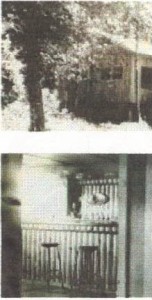 The Eatons lived on Crandon Street in Chicago. Their daughter and highly prized family cat spent leisurely summers at the lake with them. The Eaton daughter wore braces on her teeth — the first set of braces many locals had ever seen. Mr. Eaton fished all day and Mrs. Eaton sat for hours reading or talking with others. This went on for years until the Eaton daughter was old enough to drive; then the two women hit the road for shopping outings or touring the north woods.
The Eatons lived on Crandon Street in Chicago. Their daughter and highly prized family cat spent leisurely summers at the lake with them. The Eaton daughter wore braces on her teeth — the first set of braces many locals had ever seen. Mr. Eaton fished all day and Mrs. Eaton sat for hours reading or talking with others. This went on for years until the Eaton daughter was old enough to drive; then the two women hit the road for shopping outings or touring the north woods.
Prohibition was over in 1931, but it was still against the law to sell liquor to an Indian in the late 1930s. The government had half breed Indians working for them as agents to entrap bar owners. Sure enough two agents came into the Planets one evening just as Harry Menne was closing up. The two travelers stated they needed a drink right away. Harry was arrested and fined $25. The Menne employed several young women from the area who were friends of the families’ children. While the Menne owned the Planets, John Cruz, an old timer from Crandon and who had worked also for the Bruss family, sat down and ate dinner one evening. After dinner he got up and went to his room to return a short while later. He walked into the kitchen and spoke to one of the young waitresses, Kay White. John proceeded to pull out a small firearm. No one knows for sure if he knew the-weapon-was loaded, but he put it up to his forehead and said, “Watch this”. He pulled the trigger shooting himself. Kay ran screaming out the door and up the path in horror. Her screams could be heard down the Take. Many locals believe John had committed suicide in the kitchen of the Planets.
The Menne had a difficult time running the Planets successfully and Walter Bruss was happy to repossess the place.
Finally, Mrs. Ingeborg Pallesen bought the resort and made a go of it. Again the operation of the resort would be a family affair. The family was from the Racine, Wisconsin area. The Pallesen son, Arthur, and his wife, Ellen, would share the responsibility. By the time Mrs. Pallesen purchased the resort, alt the cabins but Jupiter were gone. Mr. Pallesen did not like Walter Bruss. For years Walter had been using an access road to his cabin which ran through the Planets property. Mr. Pallesen had a cabin moved onto this access to block Walter from using, that section of the drive. Mrs. Pallesen had a policy of serving minors at the bar. The only rule was that if the child’s elbows could rest on the bar while standing, they were served. There is a story that one-mornings Mrs. Rienert came running into the Planets and said, “Daddy’s gone”. Mrs. Pallesen replied, “Did he take the car?”, not realizing Mr. Reinert had died in the night.
Many Potawatomi sold baskets and other crafts to Mr. Bruss for resale to the tourists.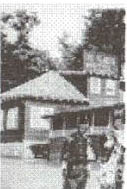 Mrs. John Manis was known for her well crafted, colorful baskets. Some of the Potawatomi tribal members would do little dances for money on the road in front of the main complex to entertain tourists.
Mrs. John Manis was known for her well crafted, colorful baskets. Some of the Potawatomi tribal members would do little dances for money on the road in front of the main complex to entertain tourists.
On August 1st and 2nd in 1925 Indians from MN., WI., N.D. and S.D. held an inter-tribal pow¬wow at Stone Lake (Lake Lucerne). Native dances included the religious, scalp, squaw, war, green com, snake fish, and friendship. Then, in 1933, Joseph (Ritchie) Johns, Ike George, Ben Alick, and Ruben Young of the Potawatomi Tribal community organized and put on an Indian Fair in the field next to the bam across old highway & from the Planets. The tribal fair attracted people from ali over. Locals and tourists alike came to see the Indians. The arts and crafts of the Indians were displayed and sold. An unknown cinematographer documented the event. Some of the Potawatomi got to see their first motion picture camera. The area buzzed with excitement.
In the late 1920s when Mrs. Alvina (Ella) Bruss was still the owner of the Planets, she would 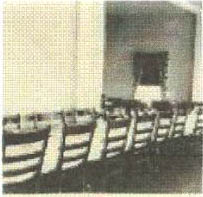 have the Ladies Club from Crandon out for meetings and socializing. Marie Ritchie and her daughters, Verol and Ruthie, sometimes worked helping get things ready for the parties at the resort. Tables needed to be set. The dining area was semi- formal with table clothes, silver, glassware and flowers. Nice for the north woods.
have the Ladies Club from Crandon out for meetings and socializing. Marie Ritchie and her daughters, Verol and Ruthie, sometimes worked helping get things ready for the parties at the resort. Tables needed to be set. The dining area was semi- formal with table clothes, silver, glassware and flowers. Nice for the north woods.
Mrs. Bruss was fond of aspic salads and these were served often. Milk, meat and eggs were brought in from an icehouse located behind the resort. Refrigeration was provided by the ice which had been cut from the lake the winter before and stored in a sawdust fUled-icehouse. Marie Ritchie often helped Mrs. Bruss clean up after a party and this included the resort’s wash. When Marie was pregnant, she often walked the mile and a halflo the resort for exercise and played cards with Mrs. Bruss.
When the Planets burned down (the first time) in 1925 one chair from the hotel was saved. That chair was brought home to the Ritchie house The Ritchie children always referred to4hisxhair as the ‘lucky chair’ since it was saved from the flames. Henry ‘Hank’ Ritchie at age 3, was sitting in that chair Verol picked up the family gun. The chair was again lucky because Hank didn’t get killed. The bullet entered Hank’s smiling mouth and went out through tissue in his cheek. Otto Bruss spent a large sum of money in 1924 adding a two story addition to the tea room and store only to see it burn to the ground next year.
Otto Bruss rebuilt the Planets Resort’s main building after the 1925 fire. At the time he was thankful the entire complex had not burned. He had work started rebuilding immediately. He did not want to loose any of his summer business. The resort could accommodate 60 paying guests.
This building was much smaller and included a small dining area and bar. Mrs. Bruss converted 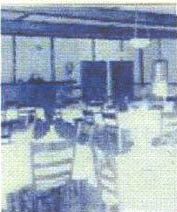 the pink brick garage to a dining area with a kitchen. An even much smaller building is there today. The Brusses sold a drink called the sidecar cocktail. Prohibition was in full swing, but the locals didn’t care much for that law. Cocktails, liquors, cordials, wines and beer were available. Some cocktails were named Planets, Lucerne, Maple and Stop and Go.
the pink brick garage to a dining area with a kitchen. An even much smaller building is there today. The Brusses sold a drink called the sidecar cocktail. Prohibition was in full swing, but the locals didn’t care much for that law. Cocktails, liquors, cordials, wines and beer were available. Some cocktails were named Planets, Lucerne, Maple and Stop and Go.
Otto’s health was failing by the end of 1930. Both Mr. and Mrs. Bruss were 68 years old in 1930. He went to Milwaukee for health reasons that winter. he had just that fall of 1930 turned over operations of the resort to Dr. J.A. Nelson. Again in the last week of the year the resort complex burned to the ground. The local fire department was called and they did rush out to the resort, but the fire pumpers got stuck in snow covered ditches as they tried to access the lake for water. With their truks useless, they watched as the building burned. Several locals showed up that evening to attend a dance which had been planned only to see smoldering ashes and blackened snow. This event marked the true end of a colorful era at the north end of the lake.
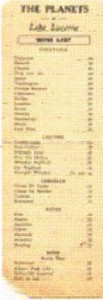 In April 1931, Otto Bruss died, some say the fire in December had accelerated his death. Too old to carry on the business without Otto, Mrs. Bruss rented out the operations of the boat house to J.F. Luther of Baraboo.
In April 1931, Otto Bruss died, some say the fire in December had accelerated his death. Too old to carry on the business without Otto, Mrs. Bruss rented out the operations of the boat house to J.F. Luther of Baraboo.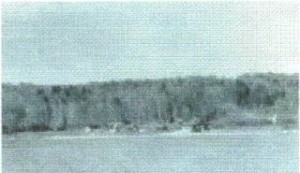 At the time he had been the assistant superintendent of the Devil’s Lake State Park down state. Luther sold soft drinks and ice cream, rented boats and provided live minnows for bait.
At the time he had been the assistant superintendent of the Devil’s Lake State Park down state. Luther sold soft drinks and ice cream, rented boats and provided live minnows for bait.
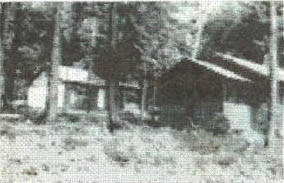 In the fall of 1931 Mrs. Bruss sold the resort to the first of a list of buyers. Aloys J. Bode of Milwaukee bought the place, making minor improvements by filling in the lake shore and removing the old bridge. The resort was kept going, but the-days of its’ former north woods prosperity had faded and are but memories of the elderly. Mrs. Bruss spent summers on the lake for many years after her property was sold. Walter Bruss maintained a home on the lake until 1984 when his son, David, sold out to a Mr. Zimmerman.
In the fall of 1931 Mrs. Bruss sold the resort to the first of a list of buyers. Aloys J. Bode of Milwaukee bought the place, making minor improvements by filling in the lake shore and removing the old bridge. The resort was kept going, but the-days of its’ former north woods prosperity had faded and are but memories of the elderly. Mrs. Bruss spent summers on the lake for many years after her property was sold. Walter Bruss maintained a home on the lake until 1984 when his son, David, sold out to a Mr. Zimmerman.
In her old age the elder Mrs. Bruss had care givers who attended to her. Her evening care giver was Clarice Ritchie, a youthful teenager, who would go down to the Bruss home and make a fire to take away the northern evening chill. The Ritchie girl would spend her nights with Mrs. Bruss. Mrs. Bruss lived to be just over 100 years old. She died in the Crandon nursing home in 1962.